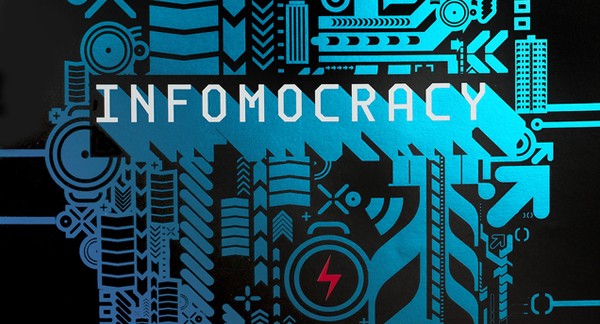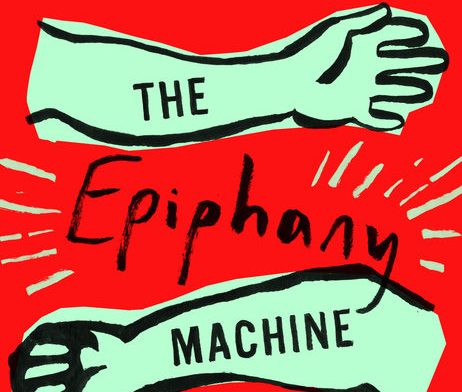Books & Culture
Infomocracy Wants YOUR vote, and Other Parallels to Our 24/7/365 Election Cycle

by Michael Tager

We live in a world where an onslaught of information is a phone swipe away, where in order to run for government, residents have to start the campaign years before it officially begins. We live in a world where the majority of an entire continent uses the same currency, has lowered its borders and accepts many of the same laws. In this world, we can travel just about anywhere in under a day. Even fifty years ago, any depiction of our current living situation would be scoffed at and termed “science fiction.”
Infomocracy, the debut novel of both Malka Older and the first publication of Tor.com, is certainly science fiction, but it sets its sights on a slew of newly arrived realities, through a speculative lens. Their Information is with them at all times and accessible with an eye flick, but it’s not so different from our phone. Their world is both border-free and border-intensive, again, sharing similarities with us today. And while the modern world has no plans for a new transportation system through the Earth’s core (that I know of), fracking, Big Digs and waste concerns are no less a concern. It’s as if Older took the concerns of 2016 and turned the dial past 11, into science fiction.
At its heart, Infomocracy is politics meeting cyber-punk, when the movers and shakers behind the power investigate crimes and shady goings-on. With roots in noir and heels firmly planted in the present, it shows a world that really isn’t too different from today. Malka Older has created a thrilling, breakneck novel with fully human characters. And it asks tough questions.
Science fiction works best when it uses technological hypotheses as a fulcrum to explore humanity. As a genre, SF is uniquely suited to look at “today” and posit questions and then go about answering those questions. Infomocracy asks those questions directly: what would happen with news cycles when the world is voting for government? What will happen when the internet is so ubiquitous we’re never separated?
In Infomocracy, geopolitical borders are blurred. No longer is the world filled with disparate nations and coalitions. Instead, the world is split (to a large degree, anyway) into micro-governments with borders splitting down lawns and sidewalks. A “centenal” of Philip-Morris may lay between two “centenals” of Policy1st, on the way to Heritage or Liberty, discrete governing bodies that vie against one another in constant news streams and election maneuvers. Former countries are broken up into these micro-governments and one city could contain hundreds or thousands of these little districts. Some of the governments are corporate, some are for the people, some are frighteningly jingoistic.
He’s managed to find a centenal where alcohol and marijuana are legal but tobacco and pop-out advertisements are not. As Ken waited for the debate to start, he checked out this government’s broader policies. They’re called Free2B, which sounds like they might promulgate that kind of individualism that gets annoying quick once your neighbor starts playing gronkytonk at top volume at five a.m. or refuses to donate to the volunteer fire department until their house is burning down, but when he scans their policies, he sees they’re reasonably socially conscious. If they’ve got anything in a more temperate climate, he’s seriously considering moving there once the election is over.
Built on the bones of cyber-punk mainstays like Neuromancer and Snow Crash, the protagonists of Infomocracy are smart, driven, tech-savvy and resourceful. The world is dangerous and vaguely dystopian, but not outside the realm of possibility. While the characters — not all nice, not all good, but all intelligent, resourceful and amusing — obviously don’t dwell on the metaphors and parallels to today’s world, they’re all there. They recognize that resources are dwindling and that an era of plenty is ending, but they look beyond,
She takes a look at the menu and checks her body stats. The endive-prosciutto salad mostly closely matches her nutritional needs, but that’s hardly portable. Mishima decides to splurge on the peanut butter–banana–honey sandwich instead, a true luxury given the rarity of both bananas and honey. When it arrives, she waits until the waiter walks away, then wraps the sandwich in the linen napkin and heads back to her room. She doesn’t feel like making small talk with anyone right now, and they should understand. It’s election season.
It might seem like Infomocracy is too heavy on symbolism and words of warning. It’s not the case, far from it. Mostly it’s engrossing and thought-provoking, moving quickly and jaunting from one point of view to another, from the Middle East to Japan and back. The tidbits of heavy-handedness are sparsely laid out, easily to forgive in the moment. And they serve another function, as anchors. Infomocracy is fun and clever and it’s easy to get so distracted by the plot, the characters and the fascinating world that the larger picture is missing. While that’s forgiven in the point of view of the story, it’s not forgivable in the reader. We need a way to contextualize.
Science fiction is a way to think beyond the constraints of our time. It looks into the future and constructs a possible outcome and straps a story onto a construct. It’s about ideas and reactions to those ideas. What happens when our corporations start running for government, or constructing their own? How do pundits and campaign staffers react to new and powerful modes of media? These aren’t out-of-left-field questions and they require thought experiments to interpret.
That this particular thought experiment is delightfully well written and engrossing is quite beneficial. Nothing is worse than stodgy, high-minded sci-fi. Thankfully, that’s not a worry.
New publisher Tor(.com) and Ms. Older chose a good time to debut, when the election in our own country has started to reach a saturation point and the blurring of lines between fantasy and reality is in high-gear. I’m not sure if the world proposed in Infomocracy is better or worse than the endless stream of articles, essays, videos and talking heads we have now, but it’s certainly engrossing enough to distract us from our own disquieting present.









